
Kōwhai are small woody legume trees within the genus Sophora, in the family Fabaceae, that are native to New Zealand. There are eight species, with Sophora microphylla and S. tetraptera being the most recognised as large trees. Their natural habitat is beside streams and on the edges of forest, in lowland or mountain open areas. Kōwhai trees grow throughout the country and are a common feature in New Zealand gardens. Outside of New Zealand, kōwhai tend to be restricted to mild temperate maritime climates.

Sophora microphylla, commonly known as weeping kōwhai and small-leaved kōwhai, is a species of flowering tree in the family Fabaceae native to New Zealand. It is the most widespread of the eight species of kōwhai. It is also called South Island kōwhai, although this name is misleading as it is widely distributed throughout the main islands of the country.
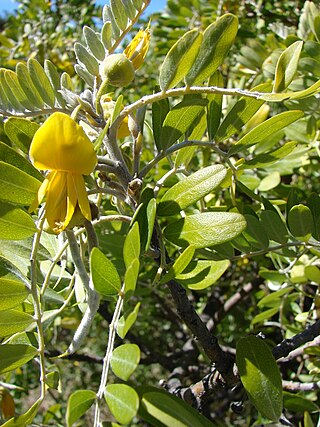
Sophora is a genus of about 45 species of small trees and shrubs in the pea family Fabaceae. The species have a pantropical distribution. The generic name is derived from sophera, an Arabic name for a pea-flowered tree.
Lepista is a genus of moths in the subfamily Arctiinae. The genus was described by Wallengren in 1863.
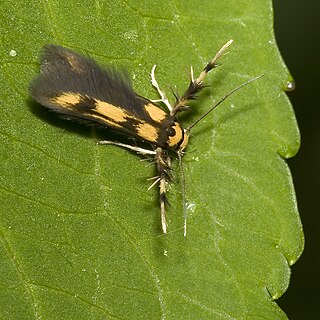
Stathmopoda pedella is a species of moth of the family Stathmopodidae. It is found in Europe.

Stathmopoda melanochra is a species of moth of the family Stathmopodidae. It is found in Australia and New Zealand.

Stathmopoda is a genus of moths. It has variously been placed in its own family, Stathmopodidae, or in subfamily Stathmopodinae in the family Oecophoridae. Note that the phylogeny and systematics of gelechoid moths are still not fully resolved.

Stathmopoda auriferella is a species of moth in the Stathmopodidae family. It is found in the Oriental and Afrotropical regions. In the Palearctic it is only found in subtropical areas such as the Middle East and the Russian Far East.
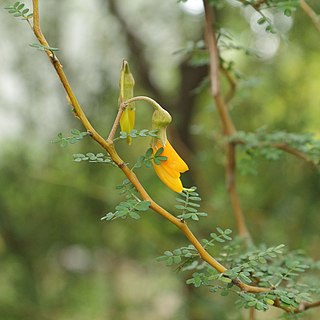
Sophora prostrata is commonly known as kōwhai, prostrate kōwhai or dwarf kōwhai and is endemic to the eastern South Island from Marlborough to the Waitaki Valley in New Zealand although most commonly found on the Banks Peninsula.

Sophora godleyi, also known as Godley's kōwhai, papa kōwhai or Rangitikei kōwhai, grows naturally in the west of the North Island of New Zealand from Te Kūiti to Manawatū. It is one of eight recognised species of kōwhai and was described as a separate species in 2001, having formerly been considered to be part of species small-leaved kōwhai. It is named after Dr. Eric Godley, former head of the Department of Scientific and Industrial Research (DSIR) Botany Division.
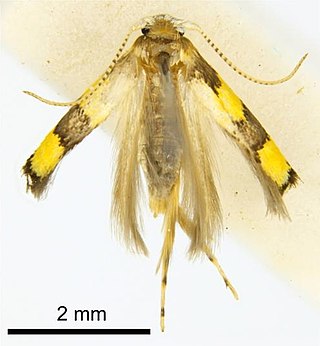
Stathmopoda trichrysa is a species of moth in the Stathmopodidae family. It is found on Fiji.
Stathmopoda endotherma is a species of moth in the family Stathmopodidae. It is endemic to New Zealand. It is classified as "At Risk, Naturally Uncommon" by the Department of Conservation.

Stathmopoda holochra is a moth of the family Stathmopodidae. It was described by Edward Meyrick in 1889 using specimens first collected at the Wellington Botanic Garden. It is endemic to New Zealand. The larvae of this species feed on Phormium seed heads.

Stathmopoda skelloni, the yellow featherfoot, is a species of moth in the Stathmopodidae family. It is endemic to New Zealand and can be found throughout the country. This species inhabits native forest, coastal dunes and shrubland as well as cultivated gardens and orchards. The larvae of this species feed on a variety of plant species including agricultural crops such as kiwifruit and persimmons. The adult moths are on the wing from September until March and are nocturnal but are attracted to light.

Sophora chathamica, the coastal kōwhai, sometimes known as Chatham Island kōwhai, is one of 8 species of native sophora or kōwhai in New Zealand and grows naturally in the north-west of the North Island in New Zealand, as far south as the Tongaporutu River in north Taranaki, and as far north as Te Paki. It can also be found growing near Wellington and the Chatham Islands, although these later plantings are thought to be a result of Māori plantings in the late 18th century and early 19th century. Prior to 2001, it was included as variant of Sophora microphylla, therefore references to either Sophora microphylla var. chathamica or Sophora microphylla subsp. microphylla var. chathamica are considered references to coastal kowhai.

Stathmopodidae is a family of moths in the moth superfamily Gelechioidea described by Edward Meyrick in 1913.
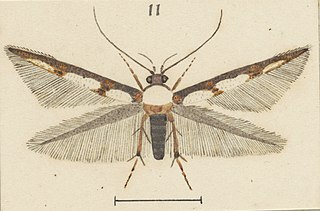
Stathmopoda aristodoxa is a species of moth in the family Stathmopodidae. It is endemic to New Zealand. It is classified as "At Risk, Naturally Uncommon" by the Department of Conservation.
Stathmopoda diplaspis is a moth of the Stathmopodidae family. It is found in United Kingdom, Saudi Arabia, Iran, Afghanistan, Pakistan, India, Sri Lanka, Tajikistan, Afghanistan and Thailand.
Stathmopoda masinissa, the persimmon fruit moth, is a moth of the family Stathmopodidae. The species was first described by Edward Meyrick in 1906. It is a serious pest on several persimmon species. It is found in several Old World countries Japan, Korea, Australia, Sri Lanka, Thailand and China.

Stathmopoda stimulata is a moth of the family Stathmopodidae first described by Edward Meyrick in 1913. It is found in India and Sri Lanka. Japan and Korea
















